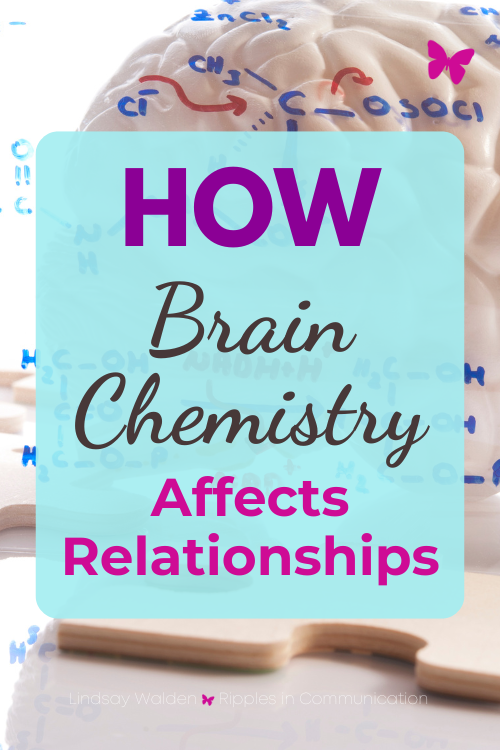How Understanding Your Brain Chemistry Can Save Your Relationship
Relationships can be tough, especially when it feels like you and your partner are constantly misunderstanding each other. Maybe you’re feeling overwhelmed by emotions that seem to come out of nowhere, or perhaps your partner just isn’t as engaged as they used to be. It can feel like you’re speaking different languages, but what if the problem isn’t you or your partner, but something happening inside your brain?
Have you gotten my FREE Relationship Communication Guide yet? Start building an authentic, conscious, and thriving relationship with your partner TODAY. Say goodbye to misunderstandings, conflicts, and missed opportunities and dive in and learn how to communicate better for a deeper connection. These are the same tips and practical advice I give to my clients every day. With this guide, you'll be equipped to navigate any communication challenge and build a strong and fulfilling bond with your partner. Click the button below to enter your email address and I will send the guide to your inbox right away!
Let’s talk about neurotransmitters—those little chemical messengers in your brain that influence your mood, thoughts, feelings, and behavior. Understanding how these neurotransmitters work can be a game changer for improving communication and emotional regulation in your relationship. And don’t worry, I am going to break it all down in a way that’s easy to understand.
Meet Your Brain’s Messengers:
Think of neurotransmitters as your brain’s text messages. They send quick, important updates that affect how you feel and react in different situations. There are four key neurotransmitters we’re going to focus on:
1. Serotonin:
What It Does: Serotonin is like your brain’s mood manager. It helps keep your emotions in check and can make you feel calm and happy.
Why It Matters: When your serotonin levels drop, you might find yourself feeling extra sensitive, like every little thing gets under your skin. This can lead to unnecessary conflicts with your partner because you’re more likely to take things personally or overreact.
2. Dopamine:
What It Does: Dopamine is your brain’s reward system. It’s the neurotransmitter that makes you feel excited and motivated when you do something you enjoy.
Why It Matters: High levels of dopamine can make you crave more connection and affirmation from your partner. If they don’t respond the way you expect, it can lead to feelings of disappointment and misunderstanding.
3. Norepinephrine:
What It Does: Norepinephrine is like your brain’s alarm system. It’s involved in the fight-or-flight response, which is your body’s way of protecting you from danger.
Why It Matters: If your norepinephrine levels are too high, you might feel constantly on edge, ready to defend yourself even when there’s no real threat. This can cause you to overreact to small issues, turning minor disagreements into major arguments.
4. GABA:
What It Does: GABA is your brain’s natural tranquilizer. It helps calm you down and prevents you from feeling too overwhelmed.
Why It Matters: When GABA is doing its job, you feel more relaxed and less likely to get stressed out by everyday challenges. But if GABA levels are low, it’s easy to become overstimulated and anxious, which can strain your relationship.
Discover how brain chemistry influences your relationship dynamics and learn practical tips for improving communication and emotional connection. Understanding neurotransmitters like serotonin and dopamine can transform how you interact with your partner. Learn more about the science behind your emotions and how it impacts your relationship.
Real-Life Example: David and Emma’s Journey
Let’s look at how understanding these neurotransmitters helped a couple I worked with. David and Emma came to me to help them work through some issues and attempt to improve their relationship.
David and Emma had been stuck in a cycle of misunderstandings and emotional reactivity. Emma tended to overreact to minor issues, quickly jumping to conclusions and starting arguments with David. This was likely due to low serotonin and high norepinephrine levels, which made her more sensitive and defensive.
David, on the other hand, struggled to stay motivated and engaged in their relationship. He found it hard to understand Emma’s emotional needs, leading to a sense of disconnection. His dopamine levels might have been low, making it difficult for him to feel excited about spending time together or taking part in shared activities.
After reading about Cognitive Neuro Therapy (CNT) and how it could help, David and Emma decided to give it a try. CNT provided them with tools to understand how their brain chemistry was affecting their emotions and behavior, and more importantly, how to make positive changes. They were able to work on themselves at an individual level and by doing that, they worked on their relationship, too.
The Power of Emotional Neutrality
One of the key concepts they learned in CNT was “emotional neutrality.” This is all about taking a step back from your immediate emotional reactions and looking at them from a more objective standpoint. Instead of letting their neurotransmitters control them, David and Emma learned to observe their feelings and understand where they were coming from.
For Emma, this meant focusing on activities that naturally boosted her serotonin levels, like spending time outdoors, practicing mindfulness, and engaging in hobbies that brought her joy. She also worked on calming her norepinephrine system by adopting better stress management techniques, such as deep breathing and regular physical exercise. None of these strategies were complicated, but by consistently practicing them, Emma started to feel more balanced and less reactive.
David, on the other hand, needed to increase his dopamine levels. He started engaging in activities that made him feel accomplished and rewarded, like taking up new hobbies and setting small goals that gave him a sense of progress. This helped him feel more motivated and connected in his relationship with Emma.
Empower your relationship by understanding how neurotransmitters like serotonin and dopamine affect your emotions. Learn how to take control and create a more balanced and fulfilling connection with your partner.
Building a Stronger, Happier Relationship
As David and Emma became more aware of how their neurotransmitters influenced their emotions and behavior, they were able to communicate more effectively. They started to manage their emotional responses better, which led to fewer misunderstandings and a more harmonious relationship.
By applying the principles of Cognitive Neuro Therapy, they learned to maintain emotional neutrality. This allowed them to approach their relationship challenges with greater calmness and clarity. Instead of getting caught up in the heat of the moment, they could step back, understand their brain chemistry, and respond in a way that was more thoughtful and less reactive.
This shift in perspective brought David and Emma closer together. They developed a “same team” mentality, where they worked together to tackle issues instead of letting them drive a wedge between them. Their relationship grew stronger as they learned to support each other through the ups and downs, understanding that their brain chemistry was just one piece of the puzzle.
Your Turn! Take Control of Your Brain Chemistry
Understanding how your brain chemistry affects your relationship can be the key to unlocking better communication, stronger connections, and a happier life together. By learning about neurotransmitters like serotonin, dopamine, norepinephrine, and GABA, you can start to take control of your emotions and reactions, leading to a more balanced and fulfilling relationship.
If you’re ready to make a change and dive deeper into how Cognitive Neuro Therapy can help you and your partner, don’t hesitate to reach out. Together, we can work on building the strong, healthy relationship you deserve. I offer a free 15 minute chat so you can get a feel for how I work and so I can get an idea of how I can help you.
Discover how understanding your brain chemistry can help you manage emotions and improve communication in your relationship. Learn a simple mindset shift that can lead to healthier, more effective interactions with your partner.








